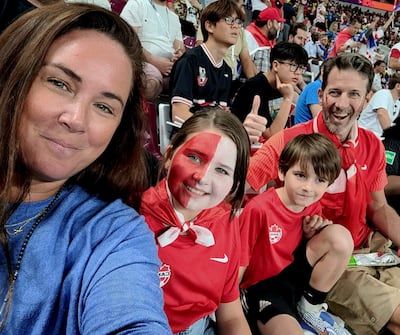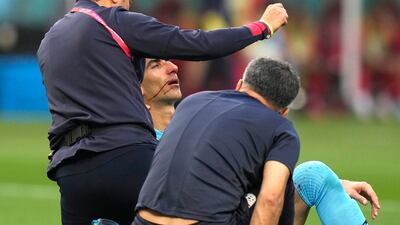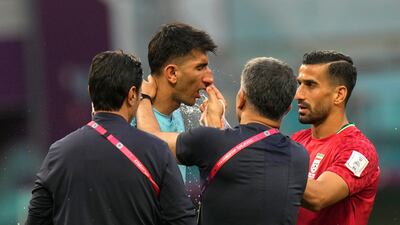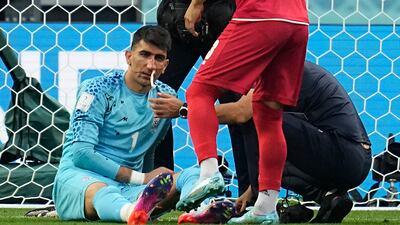A sickening clash of heads between Iran's goalkeeper Alireza Beiranvand and a teammate in his side’s opening World Cup match against England exposed the work still needed to raise awareness of sports-related brain injuries, experts said.
Despite displaying clear signs of serious head injury, Beiranvard attempted to play on, before falling to the ground and being substituted.
The incident was branded a “disgrace” by UK brain injury charity Headway, while doctors and ex-professional footballers in the UAE said it showed a lack of global awareness about head injuries and dementia later in life.
Jay French, a former professional footballer now living in the UAE, said it put a spotlight on the world of sports and the need to do more to tackle the issue of brain injuries.
a former professional footballer
Mr French is involved in a 10-year longitudinal study to assess the impact of such injuries on players and hopes people and retired professionals from the Emirates will get involved in it.
He is taking part in “Screening Cognitive Outcomes after Repetitive head impact Exposure” (Score) research by the University of East Anglia in the UK.
A former Canadian professional player, Mr French, had trials with Norwich City in 1996 and played lower league football. He hopes research results can reshape youth football to prevent long-term brain damage.
The project involves studying the results of online brain assessments and MRI scans to detect very early signs of dementia in ex-pro footballers.
“I played many hours of intense football in training and games, especially from the age of 17 to 24,” said Mr French.

“I have had eight to 12 head stitches, two or three concussions, and a nose broken twice from elbows or head clashes.
“These injuries are not as bad as in some other sports, but their repetitiveness causes problems.
“There was a masculine attitude of just getting on with it — even if you were bleeding or confused you would play on.
“That seems wrong today and we have seen a couple of incidents in the World Cup where there does not seem to be a clarity of procedure.”
Tackling the issue of head injuries
Now working in the Dubai real estate sector, Mr French hopes other professionals will come forward to take part in the research, which has also involved former international players Mark Bright and Iwan Roberts.
Mr French said a standardised annual test for cognitive reactions, like an eye or hearing test, would help detect issues at an earlier stage.
“We were discussing what we could now do in the UAE with the University of East Anglia to expand the research,” said Mr French, who sponsors Dubai’s Elite Sports Academy for children.
“In such a football-mad country, it made sense to spread understanding of what we are trying to accomplish to help young children.
“There are huge benefits to the brain playing football, but we also need to be smart about what we are doing with contact sports.”
A recent clinical study of nearly 8,000 deceased former professional football players showed they were five times more likely to die from Alzheimer’s disease than the general population.
Fifa concussion protocols under scrutiny
Fifa concussion protocols have come under scrutiny at the World Cup in Qatar, with teams under pressure to field their strongest side on the world’s biggest stage.
Individual team doctors have the final say on player welfare after a head injury and decide if they can continue safely.
At the University of East Anglia, Dr Michael Grey is studying the brain health of hundreds of former professional football players aged 50 and over.
“This project began by understanding there was a need for early detection, and to get people in for help earlier,” he said.
“We found the risk of degeneration is much greater in those who played professional football than the average person.
“We have demonstrated their brain health is better than average below the age of 50, but worse than average when over 65.”
Elsewhere, new guidance is being introduced in Scottish football to protect players and includes restricting heading on days before and after a match.
Professional clubs are also following guidance to limit exercises that involve regular heading, after research showed footballers were up to three and a half times more likely to die from brain disease.
Dr Grey has digitised standard neural tests for brain function that can be completed at home via a laptop or tablet in the hope of increasing uptake among former professionals.
The half-hour tests on spatial awareness and memory can be done every three months, and are time-stamped to monitor any cognitive degeneration.
“When more former professional sportspeople come forward to talk about their experiences, that helps deliver a powerful message,” he said.
“Quite a few people still do not believe this is a problem.
“Football has been good to them, and they may not know anyone with dementia.
“Some are burying their heads in the sand, as the business of the game is more important than player welfare.”








